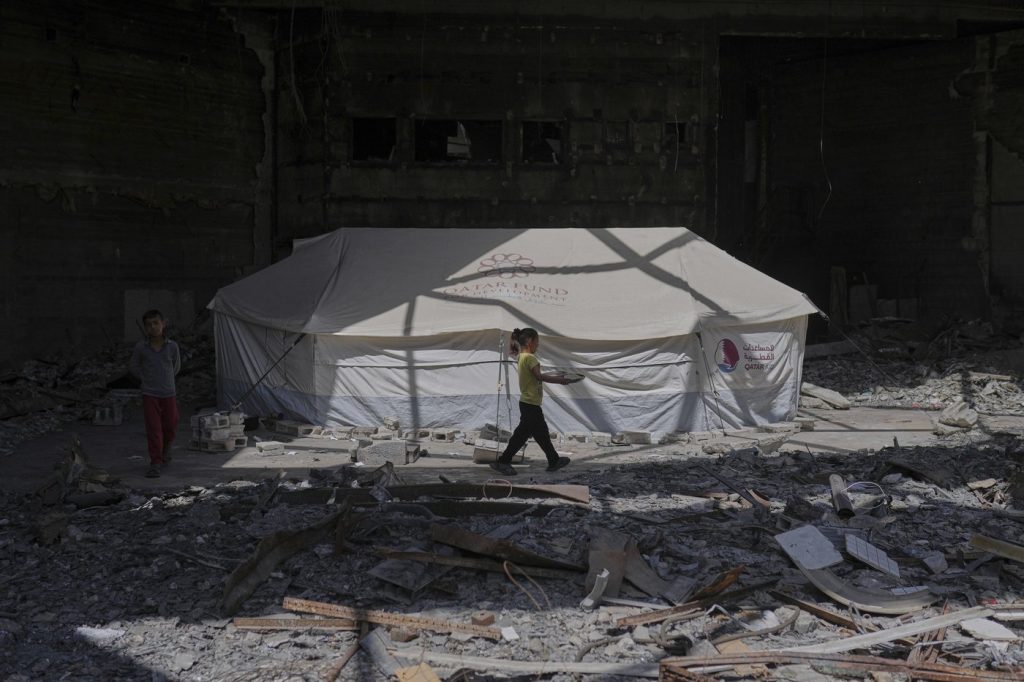DEIR AL-BALAH, Gaza Strip (AP) — Arab mediators are currently formulating a proposal aimed at ending the ongoing Israel-Hamas war, which would consist of a truce lasting between five to seven years, coupled with the release of all remaining hostages. Overnight Israeli airstrikes on the Gaza Strip resulted in the deaths of nine people, as reported by local health authorities.
Egypt and Qatar are involved in the development of this proposal, which anticipates a gradual withdrawal of Israeli forces from the Gaza Strip and the release of Palestinian prisoners. This information was provided by an Egyptian official and a Hamas official, both of whom requested anonymity due to the sensitive nature of the discussions.
Israel had terminated a previous ceasefire with Hamas last month, pledging to continue military actions until all hostages are returned and Hamas is either dismantled or forced into exile. The country has also enforced a blockade on the territory, halting all imports, including essential supplies such as food, and has declared its intention to retain control over parts of Gaza indefinitely.
In return for the release of the remaining hostages, Hamas has insisted on a complete withdrawal of Israeli forces, a release of Palestinian prisoners, and a lasting ceasefire. These terms align with a previously established agreement in January, which has since become defunct. A Hamas delegation arrived in Cairo to discuss the evolving proposal further.
An Egyptian official disclosed that the proposed truce would include international guarantees and would be overseen by a committee of politically neutral technocrats, a structure that Hamas has indicated it would accept. The Hamas official also mentioned the group's openness to a long-term truce with complete Israeli withdrawal, citing possible international guarantors such as Russia, China, Turkey, or the United Nations Security Council.
Turkey recently entered the negotiations, despite its historically tense relationship with Israel. While there has been no immediate response from Israeli officials, the Israeli government has explicitly ruled out any agreement that would allow Hamas to maintain its influence in Gaza or rearm. The Trump administration has voiced full support for Israel’s position in the ceasefire discussions.
Israel and the United States have urged Hamas to consider a temporary truce, which would entail the immediate release of several hostages in exchange for vague commitments regarding future negotiations on a more permanent ceasefire. Hamas has consistently rejected these proposals, maintaining that disarmament is contingent on the withdrawal of Israeli forces from Palestinian territory.
A Hamas official expressed distrust toward both Israeli Prime Minister Netanyahu and the U.S. due to their previous actions that undermined the prior ceasefire agreement, which had allowed for the release of over 30 hostages. Meanwhile, the Egyptian official mentioned that mediators sensed President Donald Trump's eagerness to broker a deal before his upcoming trip to the region in mid-May, during which he will visit Saudi Arabia, Qatar, and the United Arab Emirates.
On the ground, Israeli airstrikes have intensified following the end of the ceasefire, with numerous attacks causing significant casualties. Presently, the Israeli military has extended its control over approximately 50% of the Gaza Strip, implementing a buffer zone along the border and encircling southern Rafah. Since early March, Gaza has been sealed off from vital supplies, leading humanitarian organizations to report soaring malnutrition rates among children, with many families subsisting on minimal food intake.
Recent attacks have seen significant civilian casualties. Among the latest incidents was an overnight strike that targeted a school-turned-shelter in Gaza City, where at least five people were killed. The local Civil Defense reported recovering four additional bodies from strikes on residential homes, noting that there could be more victims trapped beneath the rubble.
Despite the rising death toll, the Israeli military claims it selectively targets militants and attributes civilian casualties to Hamas's tactics of operating within densely populated areas. According to local health sources, the conflict has led to over 51,000 Palestinian deaths, predominantly among women and children, although the exact number of militants versus civilians remains unclarified. Israel claims to have killed around 20,000 militants, but this assertion has not been substantiated with evidence.
Since the outbreak of hostilities on October 7, 2023, when Hamas militants conducted surprise attacks in southern Israel leading to the deaths of roughly 1,200 individuals and the abduction of 251, the humanitarian crisis in Gaza has escalated dramatically, creating an urgent need for a resolution.











